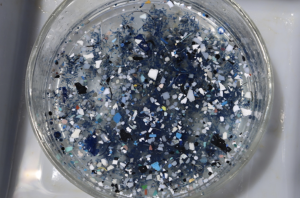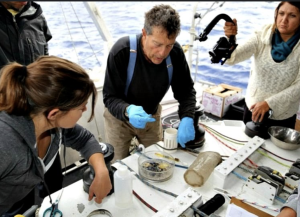For the Algalita Marine Research and Education their 3 decades of plastic pollution research and education it all started in the 1990’s with an eye-opening discovery in the North Pacific by the organizations Founder, Charles Moore.

Credit Algalita Marina Research
The organization’s initial mission was to restore the disappearing kelp forests and improve water quality along the California coast. But that all changed when Moore made a startling discovery at sea. Taking a shortcut from Hawaii to California aboard his 50-foot catamaran he veered away from his usual course and went through the rarely traveled North Pacific Gyre.
He recalls that “As I gazed from the deck at the surface of what ought to have been a pristine ocean, I was confronted, as far as the eye could see, with the sight of plastic,” the captain wrote in an essay for Natural History. “It seemed unbelievable, but I never found a clear spot. In the week it took to cross the subtropical high, no matter what time of day I looked, plastic debris was floating everywhere: bottles, bottle caps, wrappers, fragments.”
Since then, for the past 30 years, Algalita has pioneered the scientific study of plastic pollution in the marine environment. The organization has literally made it its mission to understand the enormity of the problem and share our findings with the public and other organizations.

Founder Algalita Marine Research
Credit Algalita.org
The organization has taken the lead in integrating global research on marine plastic pollution. The organization participates in a number of collaborative projects such as reducing plastic debris in the Los Angeles and San Gabriel watersheds, studying microplastics in inshore Hawaiian waters and Japanese Tsunami Debris Field Investigation.
Through their Wayfinder student and educator hubs they provide lessons, toolkits, educational videos and events that provide opportunities to “investigate in order to educate.” And Wayfinder offers educator mini-grants to fund environmental educational materials, projects and field trips. Algalita has a number of youth and children educational initiatives.
The organization has hosted summits for teachers and students such as a Plastic Ocean Pollution Youth Summit. And, educational materials have included an Algalita Debris Science Investigation Kit—a complete curriculum set on the impacts of plastic marine debris customized for one 50-minute period. They also provide STEM (science, technology, engineering, and math) workshops. Their programs have connected thousands of students from around the world with their team , their research and their experiential education programs on plastic pollution.
For information on marine plastic pollution research collaborations, their student and educator programs or opportunities to volunteer, donate and get involved visit http://www.algalita.org
